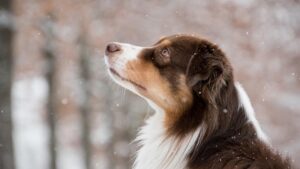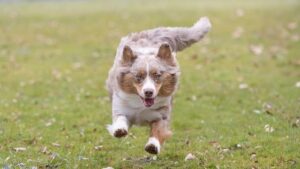Dog Chewing Paws: Causes and Relief Tips (Vet Verified)
If you have ever seen your furry friend obsessively lick, bite, or chew at their paws, you know how unsettling it can be. When this behavior escalates, it can lead to secondary issues like irritation and infection, making it crucial to understand the root cause.
This guide explains the top reasons behind a dog chewing paws and offers you actionable tips for relief.
Key Takeaways
- Excessive chewing is not normal.
- The top cause is itching caused by allergies or parasites.
- Check if your dog is chewing one paw (indicates localized pain) or all paws (indicates a general issue).
- If the behavior is persistent, see a vet to diagnose the root cause.
- Use a dog health tracker to help you spot early changes in restlessness or excessive grooming patterns before visible irritation occurs, allowing for faster treatment.
Why Is My Dog Chewing Paws? Understanding the Instinct
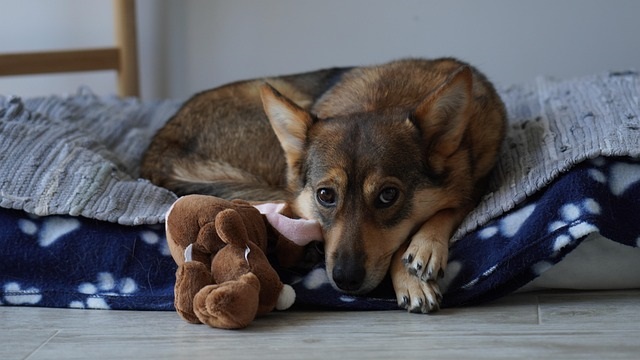
When a dog chews or licks its paws persistently, it’s performing a self-soothing or attempt-at-healing behavior.
The causes generally fall into three categories: pain, itch, or anxiety.
Why Is My Dog Biting His Foot?
If you notice your dog biting paws aggressively, especially focusing on a single foot, the cause is likely pain or a localized irritation.
Look for any of these issues:
- Foreign Body: Your dog may be trying to remove something like a splinter object lodged between the toes or pads.
- Torn Nail: A broken or ingrown toenail is extremely painful and makes dogs chew their paws.
- Injuries: Cuts, minor lacerations, or burns from hot pavement or chemical irritants will cause focused chewing.
- Arthritis: Pain from joint degeneration often causes a dog to lick and chew at the source of discomfort.
Why Do Dogs Lick Their Feet?
When dogs lick their feet persistently, it’s usually because of intense itchiness caused by skin issues like allergies and infections.
“I got the Maven sensor for my 14-year-old Chihuahua mix with heart and trachea issues. It gave me back peace of mind – I can track her RRR, BPM, drinking, and activity anytime and know instantly if something’s wrong. Highly recommend!”

★★★★★
Chiara De Luca
Titti
Most Common Causes in Detail
The frequent licking, biting, or chewing of paws is frequently a sign there is a problem. The most common causes include:
Allergies
This is the most frequent cause. It’s an immune system overreaction to environmental allergens or specific foods.
Signs: Red, inflamed skin on the paws, belly, and ears; persistent and intense itching.
Dermatitis and Infection
When the skin becomes infected by bacteria or yeast.
Signs: Redness, swelling, crusting, hair loss, and a distinctive, often foul or yeasty odor.
Parasites
Infestations by fleas, mites or ticks can cause maddening, intense itching localized to the feet.
Signs: Hair loss, red bumps, and extreme scratching.
Pain
The dog licks to soothe an acute injury or chronic discomfort.
Signs: Limping, holding a paw up, refusing to bear weight, or focusing the chewing exclusively on one foot (suggesting an injury or arthritis).
Anxiety
Chewing becomes a self-soothing ritual for dogs experiencing stress, separation anxiety, or boredom.
Signs: Pacing, restlessness, chewing often focused on the front paws, and the behavior worsens when the dog is alone.
When Paw Chewing Signals a Health Issue
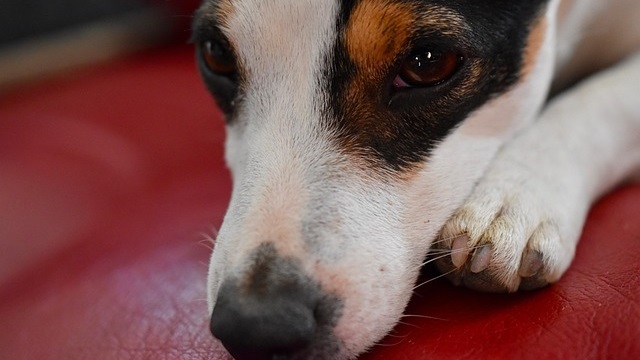
“Frequent paw chewing is one of the earliest signs of skin allergies in dogs. Spotting the behavior early helps us prevent more serious irritation.” – Joana Babo, DVM, Veterinarian at Maven Pet
Occasional, brief licking after walking on a dirty surface is normal. You should seek vet advice immediately if you notice any of these accompanying signs:
- Visible injury
- Intense inflammation
- Persistent, strong odor in the area
- Behavioral changes like limping, holding a paw up, refusing to bear weight, or exhibiting extreme restlessness
- Relentless licking or chewing
What Pet Parents Can Do at Home
While you wait for a vet appointment, you can take steps to manage your dog’s discomfort and prevent the behavior from escalating.
- After every walk, clean the pads and spaces between the toes
- Have your dog wear a recovery cone to prevent them from chewing
- If boredom or anxiety is a suspected factor, provide more challenging activities, such puzzle toys, snuffle mats, and enrichment games
- Ensure your dog is on a vet-recommended year-round flea and tick preventive
How Maven Pet Helps Track Paw-Chewing Behavior & Itching Patterns
Because paw chewing is often a response to invisible factors like itchiness or internal pain, it can be hard for dog parents to track how often it occurs or if it’s getting worse.
A pet health tracker like the Maven Pet Health Monitor is essential in connecting the dots between behavior, activity, and health.
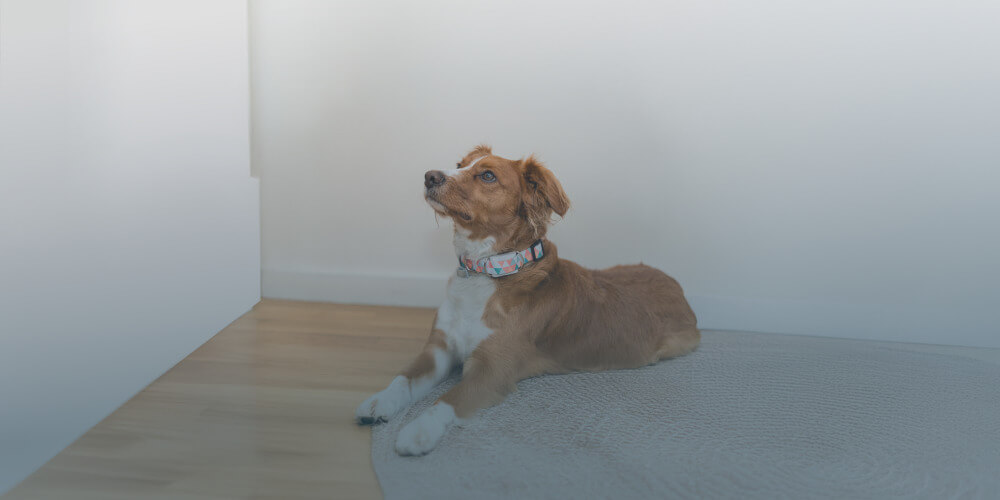
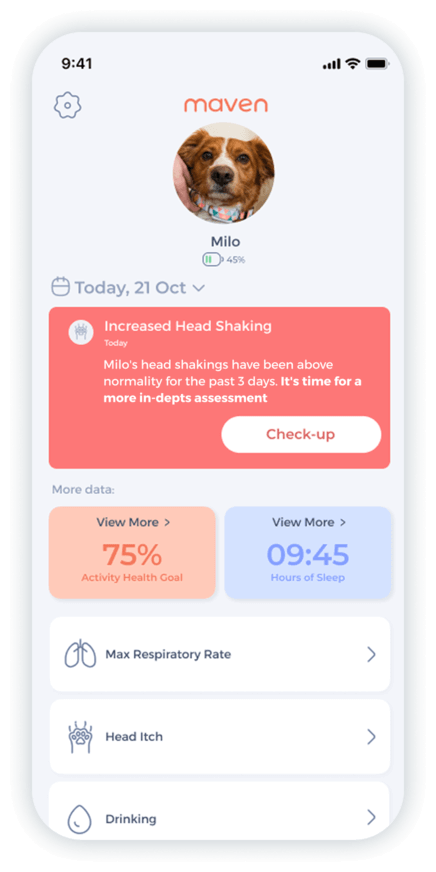
Monitor heart rate, respiratory rate, activity & rest, drinking, itch behavior.
- Identify the Baseline: The tracker uses AI to monitor your dog’s normal patterns of rest and activity. It can detect subtle but significant increases in behaviors like restlessness or intense licking before they become visible skin lesions.
- Track Patterns and Triggers: Dog parents can easily log specific environmental changes (like a new food or a high-pollen day). The pet health app helps you see if the excessive paw-chewing behavior consistently occurs after certain events or at specific times of day, providing concrete data to share with your vet.
- Measure Treatment Success: After starting a new medication or diet, the tracker objectively measures the resulting change in the dog’s licking and restlessness levels, proving whether the new treatment plan is working to improve their comfort and quality of life.
Takeaways Recap
- Be Attentive: Excessive paw chewing is a signal that your pet needs help, whether it’s from an injury, pain, or discomfort caused by an underlying condition like allergies.
- Rule Out The Top Causes: Always look for pain or skin disease, or allergies.
- Prioritize Safety: Use a cone to prevent self-trauma, which can lead to open wounds and serious secondary infections.
- Partner with Your Vet: A vet is necessary to run diagnostic tests to determine the precise cause, whether it’s infection, injury, or an allergy.
- Monitor Behavior: Using a pet health tracker can provide objective data on your dog’s restlessness and licking patterns, ensuring early intervention and the best long-term care.
Maven Pet focuses on improving the quality of life of our pets with technology, using artificial intelligence (AI) to enable proactive pet care. By accurately collecting and monitoring pet data 24/7 and flagging any irregularities, Maven Pet empowers pet parents and veterinarians to stay ahead of potential health issues, ensuring the well-being and longevity of our beloved companions.


